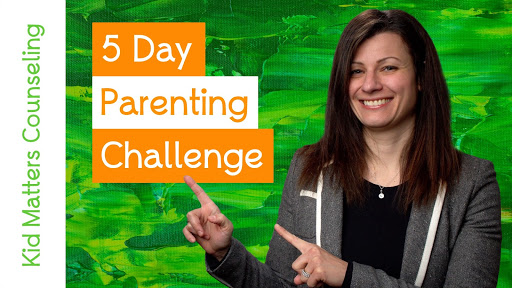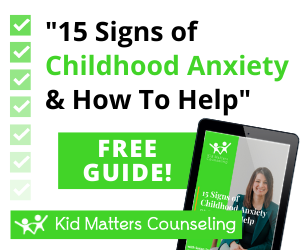Today I’m going to share with you my top 3 tips on how to parent an anxious child.
If you’re a parent with an anxious child, you may often find yourself feeling helpless or frustrated. It’s hard to know where to start. There are, however, some things parents can do to effectively support their children.
Here are my top 3 tips to parent an anxious child.
1. When children know what to expect, they feel less anxious and hypervigilant. It’s kind of like they are on high-alert; the smallest noise or change can startle them.
So preparing your child for upcoming events, letting her know her schedule for the week, and setting clear expectations will help her feel more calm. However, if there is an upcoming event which might cause anxiety, try to keep the timespan between when you tell your child about the event and when the event actually happens short.
2. 98% of parents with anxious kids engage in accommodating behaviors (that is, accommodating the anxiety). That can include anything from sleeping with your child who is afraid to sleep alone, or avoiding certain places or events-including school or social situations.
A recent study (Lebowitz, et al., 2019) completed by Yale researchers found that limiting accommodations for children ages 7-14 was as effective as Cognitive Behavioral Therapy, which is the gold standard for treating anxiety.
With a supportive and loving posture, limiting the accommodations and encouraging your child to face their feared situation results in reduced anxiety. This cannot be done, however, without your child first experiencing your warmth and compassion. A parent can say, “Oh honey, I know this feels so scary, but I am right here with you and I know you can get through this.”
3. Practicing or role-playing the anxiety-provoking situation, while reminding your child of coping skills, comforting thoughts, or positive mantras can allow your child to feel more confident engaging in the situation. For example, parents can role-play a social interaction at home that feels scary to kids while reminding them to think, “I know I can do this” or “I’ve got this.”
Afterwards, praising him for practicing the hard thing and debriefing about what coping skill he used and how his fear didn’t come true would solidify the successful experience.
Parenting an anxious child can feel helpless or frustrating. But there are many things parents can do to support their child and decrease the anxiety.
Although I shared my top 3 parenting tips on parenting an anxious child, if you find yourself getting stuck and wondering what to do next, give us a call at Kid Matters. We’d love to help your child manage their anxiety and to support you in the process.

Dr. Alana Roth
Clinical Psychologist
Do you have a child who is struggling socially, emotionally, or academically? I specialize in working with children to integrate developmentally appropriate, research-based treatments and walk alongside families in the healing process.
Kid Matters Counseling has trained therapists ready to help both kids and parents walk through the tough moments in life.
End the frustration & the confusion and let's work together! SCHEDULE APPOINTMENTNew Clients Call: (855) 586-1802
Current Clients: (855) 543-7687
Ask Us Anything!
We help anxious kids and frustrated parents. We serve Hinsdale & the Western Suburbs of Chicago.
Made with ♥︎ in Hinsdale, Illinois for Chicago
Built By Brand Your Practice.
Kid Matters Counseling, P.C. DISCLAIMER: This website and blog are for informational, educational and general discussion purposes only. It is understood that no guarantee or warranty arises from the information provided, discussed or commented upon in this website and blog nor does it constitute legal or other professional advice on any subject matter. Access to this website and blog is voluntary and at the sole risk of the user. If you think that you have a medical emergency (including clinical), call your doctor or 911 immediately. A licensed medical professional should be consulted for diagnosis and treatment of any and all medical conditions. While the information contained within this website and blog is periodically updated, no guarantee is given that the information provided is correct, complete, and/or up-to-date. See our complete Privacy Policy and Terms of Service.



